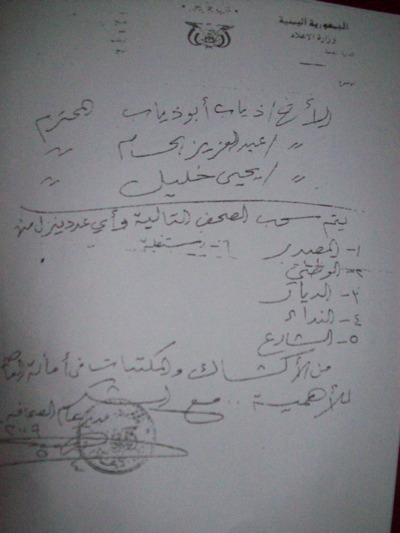Yemeni authorities prevents 6 newspapers from distribution

Yemeni government ordered the confiscation of six national newspapers, whose copies were pulled from the news stands and markets across the country yesterday alleging their role in promoting secessionism and anti-unity rhetoric. The move, according to observers, is unprecedented in recent Yemeni history and marks a serious downturn in the country's level of press freedom, which had already suffered several blows in the recent past.
The six weeklies that were prevented from distribution are Al-Masdar, Al-Watani, Al-Diyar, Al-Nida, Al-Sharei and Al-Mustakilla are known to regularly publish critical articles targeting the authorities including recent articles condemning government actions against anti-government demonstrations that took place in the end of last month in the south of the country.
The government's measure comes on the heels of another incident in which a government appointed officer burnt and confiscated thousands of copies of Al-Ayyam, which is among Yemen's most widely-read dailies. Al-Ayyam is based in the southern city of Aden and is considered among the most active in reporting about the anti-government southern movement.
According to NewsYemen [1], the authorities pledged to continue to confiscate newspapers that ‘use the rhetoric secessionism and target national unity’.
It is worth noting that an ongoing peaceful movement in the southern governorates of Yemen have gained momentum over the past months and have increasingly become more visible in the national and international media, triggering the authorities to accuse the media of targeting the country's national interests.
Among the media organizations that covered the protests, which sometimes turned violence, was Al-Jazeera Satellite TV channel. The popular Doha-based channel recently dedicated several segments to discuss the rising tensions between citizens in southern states and the central government led by President Ali Abdullah Saleh, who last year celebrated thirty years in power.
Increasingly, many southern leaders are calling for ending unity that was established between former South and North Yemen in 1990 and reverting back to the pre-unity status in two independent countries. In their calls for ‘independence from occupation by the Yemen Arab Republic’, they sight injustices occurring to the people of the south since a 3-month civil war that erupted in 1994 and that ended with the victory of the Saleh-led army that defeated the army led by Ali Salem Al-Bidh, who, prior to unity, was the President of the People's Democratic Republic of Yemen.
In 1994, Al-Bidh declared unilaterally the end of the –at the time- four-year old unity due to unfulfilled obligations on the part of President Saleh as per the regulations set forth for unity to be established. He currently lives in the neighboring Sultanate of Oman, where he was accepted for political asylum.
The confiscation of the six newspapers adds to an already bleak record for Yemen's freedom of the press. The Yemeni government had continuously been accused by human rights activists and freedom of expression advocates in Yemen and abroad of constant and worrying patterns of suppression against the press, particularly during times of crises and elections. The authorities have often prosecuted, beaten, kidnapped, and imprisoned journalists. They also closed down newspapers with court orders and sometimes prevented printing of others without court orders. The government also systematically targets online news sources and filters them through the government-operated internet service providing companies. Journalists, news website administrators and bloggers were also occasionally harassed and threatened. Journalists complain that attacks on the press are encouraged by the government's lack of action to prosecute the attackers, which indicates a state of impunity.
Among the many international organizations concerned about the media situation in Yemen is the New York-Based Committee to Protect Journalists, which has steadily and repeatedly called upon the regime to release its grip on freedom of expression in the country. In a recent report on Yemen, the CPJ ‘faulted Yemen for perpetuating a culture of impunity in attacks on the press.’ (See: http://cpj.org/2009/02/attacks-on-the-press-in-2008-yemen.php) CPJ and other organizations continue to call upon the regime in Yemen to respect freedom of expression and the rule of law and stop attacking the press and bring attackers to justice.
So far, the authorities remain unresponsive to such calls.